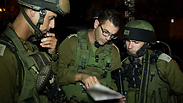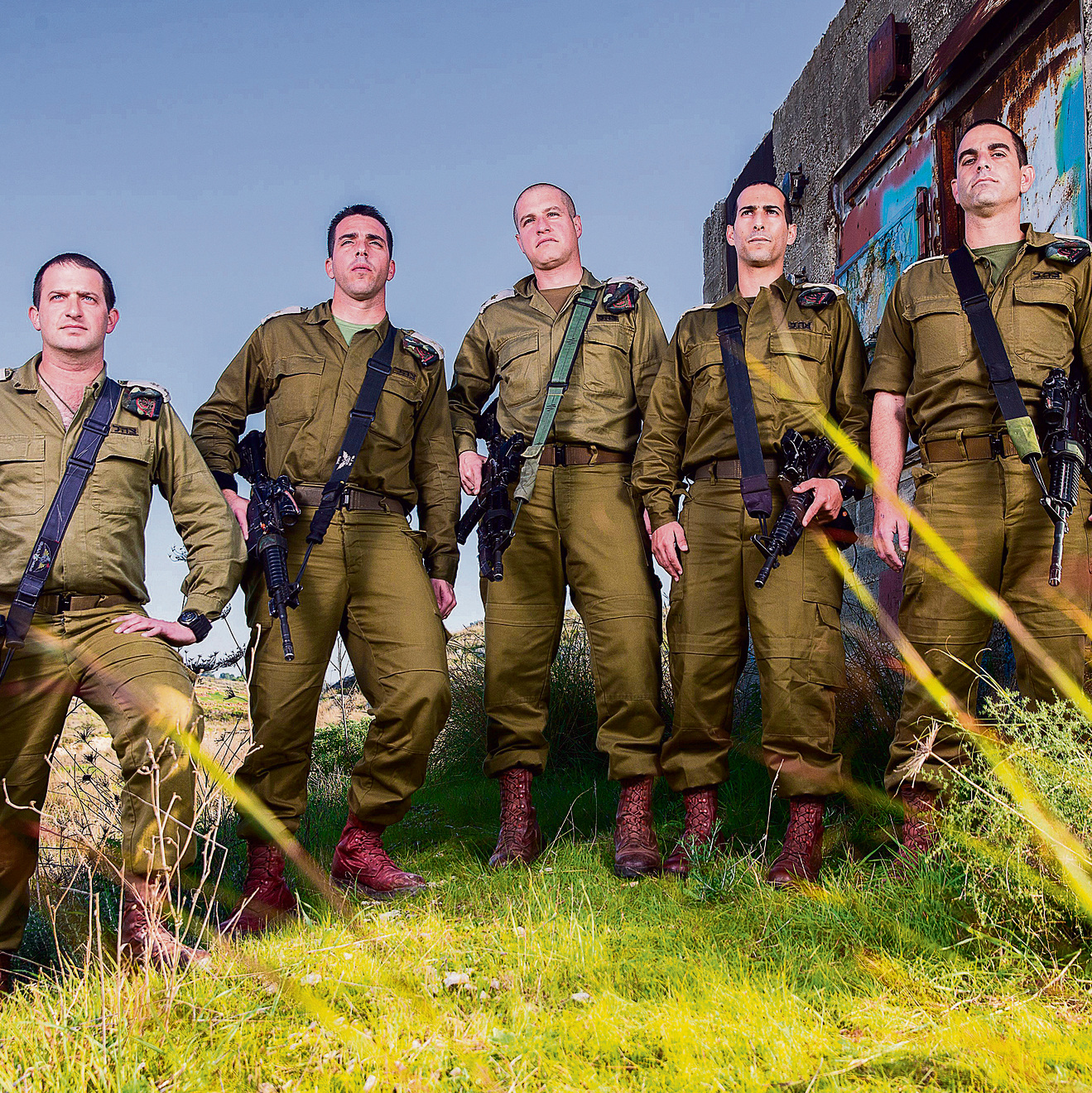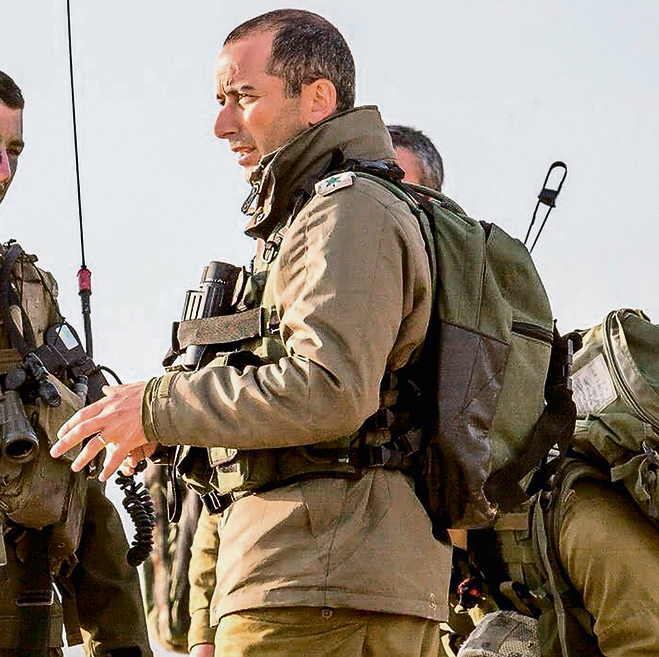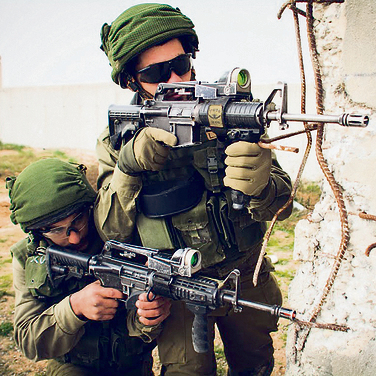
'Our fighters are the Iron Dome of the West Bank'
Over the past few months, the Kfir Brigade has been operating in one of the hottest fronts the IDF has, dealing with violent rioting, and a series of stabbing and shooting attacks. The Kfir Brigade commander and his five battalion chiefs talk about preparing for the new threats, securing Breaking the Silence tours, and why the problematic image of the Haredi Nahal is far from reality.
It’s Saturday night, shortly after 6pm. The commander of the Haruv Battalion arrives at the Harsina post in Hebron after a day of serious clashes. "As soon as I take off my (bulletproof) vest, I get a phone call from the advance guard company commander," he says. "A squad commander was critically wounded at the Beit Einun Junction. A bullet to the head. That's it. This is where the call ends. We got there. Turns out a Palestinian sniper fired at the military post with a hunting rifle, a shotgun. The soldier's helmet was filled with shots. Unfortunately, one shot got through. Wasn't stopped by the helmet. But there were also good news. I visited him yesterday. His rehabilitation is an absolute miracle - where he is today compared to where he was three months ago."
But it wasn't just a miracle. At the beginning of the current escalation of violence, when his battalion took over the Hebron sector, Lt.-Col. Yaniv Barut ordered his soldiers to fortify their posts and always wear a helmet.
"Early on we were still operating with partial protection. And we realized there are more and more incidents of stabbing in the head or the upper body. So the decision in my battalion was that everyone wears a helmet and we will fortify the posts with personal bags and head protection gear," Barut says.
This decision saved the soldier's life, or as the commander of the Haruv Battalion, one of the five battalions of the Kfir Brigade, describes it: "This is an example of operational learning. There isn’t one day that is quite like the other, and there is no sector quite like another. This is about quickly learning as we go."
Two months ago, the Kfir Brigade marked a decade to its formation. But in the midst of the escalation of violence in the West Bank, where the brigade's soldiers are fighting, there’s been no time for celebrations.
After wrapping up their operations on the IDF's hottest front these days and going into training, the commander of the brigade, Col. Guy Hazut, and his five battalion commanders, gather to talk about the changes they needed to make in order to deal with knife-wielding terrorists, the brigade's wounded soldiers, and the incidents that should not have happened.
"Despite everything, today we're still operating on the lowest level of terror that we believe we will see in this round of violence," says the brigade commander. Hazut, who was the commander of the Paratroopers' Battalion 202 after Operation Defensive Shield, and commanded over the Nablus front at the height of the second intifada, remembers times much more difficult than the current escalation.
"When I was a battalion commander, we've experienced incidents far graver, and we're preparing for such incidents as well, in case this escalation takes us there as well," he explains. "At a situation like that, we - the Kfir Brigade - are the ones expected to lead the entire army. We deal with that a lot."
How did you prepare for the current escalation? For dealing with vehicular or stabbing attacks?
"We made adjustments," Hazut says. "We significantly shortened the shifts (4 hour shifts instead of 8 hours - YY) - the fighters do shorter shifts in order to remain alert. While they aren’t on shift, they go to threat-focused shooting ranges and train in Krav Maga, and then go on shift again, and so on."
The Krav Maga training is one of the lessons learned from the ongoing violence, when a fighter can find himself at close range, and without any warning, in front of a terrorist armed with a knife. The basic training is done at the Kfir Brigade's training base in the Jordan Valley and later, the Krav Maga instructors come to the battalions on the front line.
"In order to improve their skill in the field," the brigade commander says, "we've also added a week of counter-terrorism fighting, which wasn't part of the training in the past. The counter-terrorism training deals with skills like threat-focused shooting, quickly unjamming a weapon, Krav Maga. Anything in order to do these things at a higher skill level."
According to the battalion commanders, the increase in incidents over the past few months has significantly raised the fighters' vigilance. "We've been living Judea and Samaria for a very long time," explains Lt.-Col. Uri Levy, 38, the commander of the Netzah Yehuda Battalion, better known as the Haredi Nahal.
"We've been in the same places, moving inside the division for many years. Once, it was hard for a soldier to believe. I'd tell him during briefing: 'Stabbing, vehicular attack, shooting,' and he'd say, 'When did this happen lately?' Today it's much simpler."
Between 1 to 1.5 seconds
Eight terrorists have been killed by the Netzah Yehuda troops during the current escalation. Another terrorist, who committed a terror attack in Jerusalem, was neutralized by a fighter from the battalion, who was on the bus on his way home at the time, and was passing by quite by coincidence. Six of the battalion's soldiers were wounded on operational duty, some more than once.
"I have a fighter who was wounded twice, and a platoon commander who was wounded three times," battalion commander Levy says. "I had an incredible incident at Aboud in the Binyamin sector. One of the fighters was stabbed. A fighter who was next to him identified the terrorist, tried to shoot, but his weapon jammed. The terrorist jumped him, and meanwhile he was able to unjam the weapon. The sergeant who was nearby fired four bullets over him, and hit the terrorist. The (unwounded) fighter recovered - what you were talking about before, Krav Maga, threat-focused shooting - and neutralized the terrorist. Later he saved his friend's life. For 15 minutes he put pressure on his friend's neck. The wounded soldier has since already returned to active duty."
"These incidents take somewhere between a second and a second and a half, that's it," explains Lt.-Col. Nati Keren, 34, the commander of the Duchifat Battalion. "He either rams his car or he stabs. If you don't react on time and at the necessary speed, the results are less positive."
How do you prepare a fighter for a 1.5 seconds-long incident?
"First you prepare the commanders. You put them in a situation where they understand something different is happening here, bringing them to a high level of awareness. Because the soldier eventually works with a commander. There's nowhere where the soldier operates alone. As soon as he works with a commander who understands what is expected of him, the soldier will know too. If the commander knows the battalion commander is going to come check up on him, and the battalion commander knows his commander will come check up on him and make sure he's vigilant and prepared, then it's safe to assume there will be fewer incidents."
One of the new ways for commanders to investigate an incident is through videos of the attacks being passed around on social media, like on WhatsApp.
"Today, the entire thing with the videos really simplifies what's happening," says Lt.-Col. David Shapira, the commander of the Shimshon Battalion. "You show a soldier, a fighter who is stationed at the Gush Etzion junction, that a day or two ago there was an attack here, and there's no better way of showing it, certainly with the current generation. There are videos of everything. So when they're a part of it and they see it, they too know what's going on."
Doesn't that lead soldiers to jump the gun on neutralizing? Doesn’t it cause confusion? There's been quite a bit of criticism about it.
"The orders are to remove the threat. To neutralize is to remove the threat. We tell the soldiers that they are the defensive shield standing between the terrorists and the civilians. They're Judea and Samaria's Iron Dome. 'If you're not sharp, if you're not alert, you will fail your mission.'"
How do you identify who really poses a threat?
"Understanding the threat is the real challenge," says Lt.-Col. Keren. "The threat is ageless, without organizational affiliation. We’ve tried to characterize the threat many times before - there is no particular age, no particular gender, no particular time of day. Anyone can pose a threat, both to our forces and, above all, to civilians. There's a chance that the guy who said hello to you in the morning, the same Palestinian who peacefully passed by you almost the entire time you've been here, who you even cleared through the checkpoint, checked his ID and you know he speaks fluent Hebrew, will come the next day from one situation or another, and attack you."
In order to illustrate this reality, in which it's almost impossible to foresee the threat in advance, one of the commanders describes an incident that occurred at a checkpoint near the Fawwar refugee camp in the Hebron sector.
"Every day one of the residents of the camp, a deaf and mute guy that all of the soldiers knew and said 'good morning' to every day, passes through the checkpoint. One day, after passing through the checkpoint, he simply drew out a knife when the fighters had their back to him checking a car, and stabbed one of the soldiers, before he was neutralized. We're at a situation in which you have to tell the fighters, 'respect him and suspect him.' The enemy doesn't have a profile. It could be a teenage boy with school books who's hiding a knife, or a 72 year old woman speeding at us with her car. There's no age or gender."
With the issue of the checkpoints, have the soldiers not raised the question of the occupation? Are they not asking whether they're policing?
"The righteousness of the mission is so clear, so sharp, so tangible now, that in a way, it's even simpler than before," says Lt.-Col. Barut, the Haruv battalion commander. "I didn't encounter, not even once, a conversation about the occupation or not an occupation - not from the soldiers, and not from the commanders. The fighters feel what's going on. They’re inside it, they can feel the mood on the ground."
Unlike the days of the second intifada, when today's battalion commanders were young officers, and unlike the time following Operation Cast Lead, public debate over the Breaking the Silence NGO doesn't really get into the army. There's a gap between the discussion going on in the media and on social media and what's going on inside the units, the commanders stress. It doesn't mean they don't come across the organization's operations. Every now and again they even secure the organization's tours, meant to collect testimony against the IDF.
"I was in Hebron," says Lt.-Col. Keren. "Every Friday, Breaking the Silence would come. The soldiers were an inseparable part of keeping law and order, so an Israeli citizen could walk inside Hebron."
And how to you deal with the testimony from Breaking the Silence?
"I think our soldiers and commanders are operating in this complex situation with such strong morals that they don't understand what this is all about. They don't understand what these people want. They know what they're doing. They look at their commanders, and see the example they set."
They also see unusual cases.
"And then they also see how we handle it. If there is an unusual incident, and happily we didn't have a lot, they understand through our response that this is unusual. And I'm talking about really 'minor' unusual incidents, compared to what Breaking the Silence is describing. Our spirit is one of morality, of fighting with very clear rules on human dignity, and a clear separation between those who are the enemy and those who are innocent and have the right to live their lives."
How do you prevent unusual instances?
"We deal with it," stresses Lt.-Col. Shapira. "If I, as a battalion commander, as part of my briefing before an arrest at 2am, instruct everyone on how to handle the family, and if there's a need to get them out of the house in the Bethlehem cold at 2am and that bothers me as a battalion commander - of course not to a point of failing the mission - then that shows them that the battalion commander is worried about that and that the issue should be discussed and dealt with. It's true that the mission is above everything, and that the safety of our troops is the most important thing, but if we can, it's important to minimize the friction. I talk to them about it, and the platoon commander talks to his platoon. I have 500 fighters in my battalion, and I know that there are different people with different views that, by the way, could go either way. Happily. Along with that, I have orders, there are procedures, we're not dealing with politics. There is no outside influence coming in. But we have to talk."
"I," says another battalion commander, "walk around with the candy from the battle meals always in my pocket. When you walk into a house, say 'Salam' and give a candy to a child, you change the mood in the room. With this candy you might be preventing one child from becoming a terrorist in the future. You stopped him, you saved a few more lives."
"It's important to say," says Brigade Commander Hazut, "and this is also factually backed by numbers, that the amount of unusual incidents in the Kfir Brigade is the lowest in the IDF with relation to how long we've been in Judea and Samaria. Last year we also received an award from the chief of staff. Fighting terrorism among civilians is not simple. It leads to friction with the civilian population and with the media. It requires us to constantly be involved, both among the commanders and among the fighters, so people don't get confused. So people who are in an emotional state don't do stupid things. And for them to understand the sensitivity and the complexity. We're not sweeping anything under the rug. We deal with every report we have about an unusual incident. For example, a relative sent me a post from the Facebook of one of the brigade's soldiers, who was at a squad commanders’ course at the time, and wrote a racist post. I verified it, and spoken to the commander of the Bislamach Brigade (School for Infantry Corps Professions and Squad Commanders) and told him that as far as I was concerned, that soldier was not worthy to be a commander in the brigade, and that this soldier will also be disciplined, because it's not appropriate for one of my soldiers, a fighter in the IDF, to make racist comments."
From a wedding to jail
Fighters from the Netzah Yehuda Battalion were involved in two of the more serious incidents that happened in the brigade. In one of them, several of the battalion's fighters beat up a Palestinian who was arrested in Jenin and in the other, fighters allegedly pressed a hot iron to the body of a detainee. And there was also the incident in which a weapon belonging to one of the battalion fighters' was seen being passed from hand to hand at the “wedding of hate,” during which several of the guests mocked the murder of baby Ali Dawabsheh, who was burned to death in Duma by a Jewish terrorist, by repeatedly stabbing his picture.
Lt.-Col. Levy, the battalion commander, urges to see the glass half full. "We're talking about some 90 days of fighting, with 127 missions, every night, mostly arrests at refugee camps, in Jenin and Tulkarm. You don't hear about that. While people sleep at night, this is what we do. There were a lot of really successful incidents, daily occurrences, in which we stopped terrorists from committing significant attacks in Tel Aviv.
"There are 900 Netzah Yehuda soldiers in the brigade. When you put the bad incidents we had in numbers or in percentages, these are isolated cases. The wedding incident was a soldier who went to the wedding of his childhood friend. One soldier out of 900 soldiers in Netzah Yehuda. He made an error. Abandoned his weapon. We investigated it and handled it."
"He wasn't court martialed for being at the wedding," Brigade Commander Hazut stresses. "He was court martialed (to 21 days in army jail - YY) for abandoning his weapon. We handle all incidents. In the case of the Palestinian who was beaten, those who returned to the battalion after serving a long period in prison were removed from their fighting roles, and one of them, who was more dominant, was also removed from the brigade. To me, Netzah Yehuda is a national project, and is very complex on the commanding side. It is now one of the leading battalions in the IDF in counter-terrorism. You just have to hear what the Binyamin Brigade commander says about this battalion, and what the Menashe Brigade commander, who had the battalion under his exclusive commander up until a year ago, thinks about the fact that he now has to share it with other brigades in Judea and Samaria."
In an audio recordings published by Army Radio in March 2015, Lt.-Col. Levy is heard admitting that the recruitment of ultra-Orthodox soldiers is a bluff. In the recording of comments he made at a private event, he is heard talking about one of the latest recruitments for Netzah Yehuda: "50 guys I said weren't mine. Couldn't be: No beards, no one has tzitziyot (tassels), they have pierced ears. You fooled me, it's not what it used to be."
"We're not looking at people's tzitziyot," says Brigade Commander Hazut. "I don't check the size of the kippah and whether the guy is ultra-Orthodox, and what kind of ultra-Orthodox - whether he's an ultra-Orthodox from Lithuania or a Hardal (nationalistic ultra-Orthodox). What we do though, is if we encounter soldiers whose conduct is not in line with the IDF values, we stop these people's service in the brigade. It doesn't last. Just like in the cases I mentioned before."
Does the fact that a large portion of so-called "hilltop youth" join the battalion have any influence on its activity and operations?
"That's not true," Battalion Commander Levy interrupts. "This isn't a correct statement. A very small part of the battalion is hilltop youth. I'm very happy with the soldiers that come to the battalion. Excellent soldiers, doing an excellent job, they get to excellent operational achievements. I love them. The residents in the sectors we protect are very very happy. There are dozens of requests to brigade commanders in the different sectors we're in, asking that we are not switched out and leave the sector."
"My wife's sister is baalat teshuva (became observant -ed.)," says Brigade Commander Hazut. "She lives in Bnei Brak, and she's a hardcore ultra-Orthodox. She sees me as a saint. To her, I save teens that leave the faith, and not only do I bring them back to the faith, I also help them find their way in life. Even in cases of hilltop youth. Even if it's deprived youth, and I end up recruiting them to the IDF, and all of a sudden they believe in state institutions, and I get them out of a relatively problematic path to a far straighter path. When I was the Yehuda Battalion commander I had an engineering officer who'd tell me all the time about how he used to behave as a hilltop youth and what enlisting in the army did for him and how it got him out of a problematic path."
Levy, the battalion commander, talks about a survey done among 1,000 of the battalion's released soldiers. Seventy-four percent are currently either working or are students. "This battalion does a very significant service to the State of Israel, and it's only increasing. I encounter amazing stories. For example, the commander of the battalion’s sniper platoon. An ultra-Orthodox man from Bnei Brak. When he was wounded, his parents didn't even know he was in the army. When the casualty notification officer called his home to tell his family, his father had a heart attack. The commander and his father were hospitalized together at the same hospital."
Quite a few of the brigade's fighters have been wounded during the ongoing wave of violence. "We've had 25 wounded throughout this period," Hazut says. "Unfortunately, my casualty notification officer is the busiest in the IDF. She thought she was coming to a brigade that had 170 fallen soldiers, which compared to other brigades these are small numbers (most of them served in battalions that existed before the brigade itself was formed, and fell in wars and during operational duty throughout the years - YY). Now, the casualty notification officers from other brigades feel sorry for her. There's no Friday that she doesn't spend at the hospital."
Flat-tire at the refugee camp
In the coming weeks, the brigade's fighters will finish their training period and return to active duty at the volatile front of the West Bank. "We took a break for training, but very soon we'll be returning to active duty and we know what we're getting into," Hazut explains. "That's what we've been training for. That's why the brigade was formed. And we will lead the IDF in the fight against Palestinian terrorism, with an emphasis on Judea and Samaria. In this area, our skill proves itself."
As an example of the brigade's expertise and capabilities, Hazut describes an incident that happened at the Fawwar refugee camp.
"It's one of the most violent refugee camps in Judea and Samaria. The IDF doesn't go in there at all. As the Yehuda Brigade commander, I went in there once during a chase after a terror cell that committed a terror attack and within half a minute, they threw two refrigerators, the body of a donkey and all the blocks they had on the roofs at me.
“Recently we were operating in that camp and there was a technical malfunction in one of our vehicles. The steering wheel broke. When I received the report that I had a platoon stuck at the Fawwar refugee camp, I saw one of two scenarios happening: In one - we kill ten Palestinians. In another - my soldiers are being dragged through the alleyways of Fawwar. I spoke to the Yehuda Brigade commander and he described an entirely different situation. He told me: 'Listen, your guys are incredible. Such level-headedness. They got off the vehicles, created two circles of security.' They spent an hour in the camp, didn't kill or wound anyone. The only wounded was a Palestinian woman who had a balcony collapse on her from the block-throwing of the camp residents. That is why the commanders of the territorial brigades in Judea and Samaria prefer working with Kfir Brigade battalions. That is exactly what this brigade was created for, and this is its money time."













